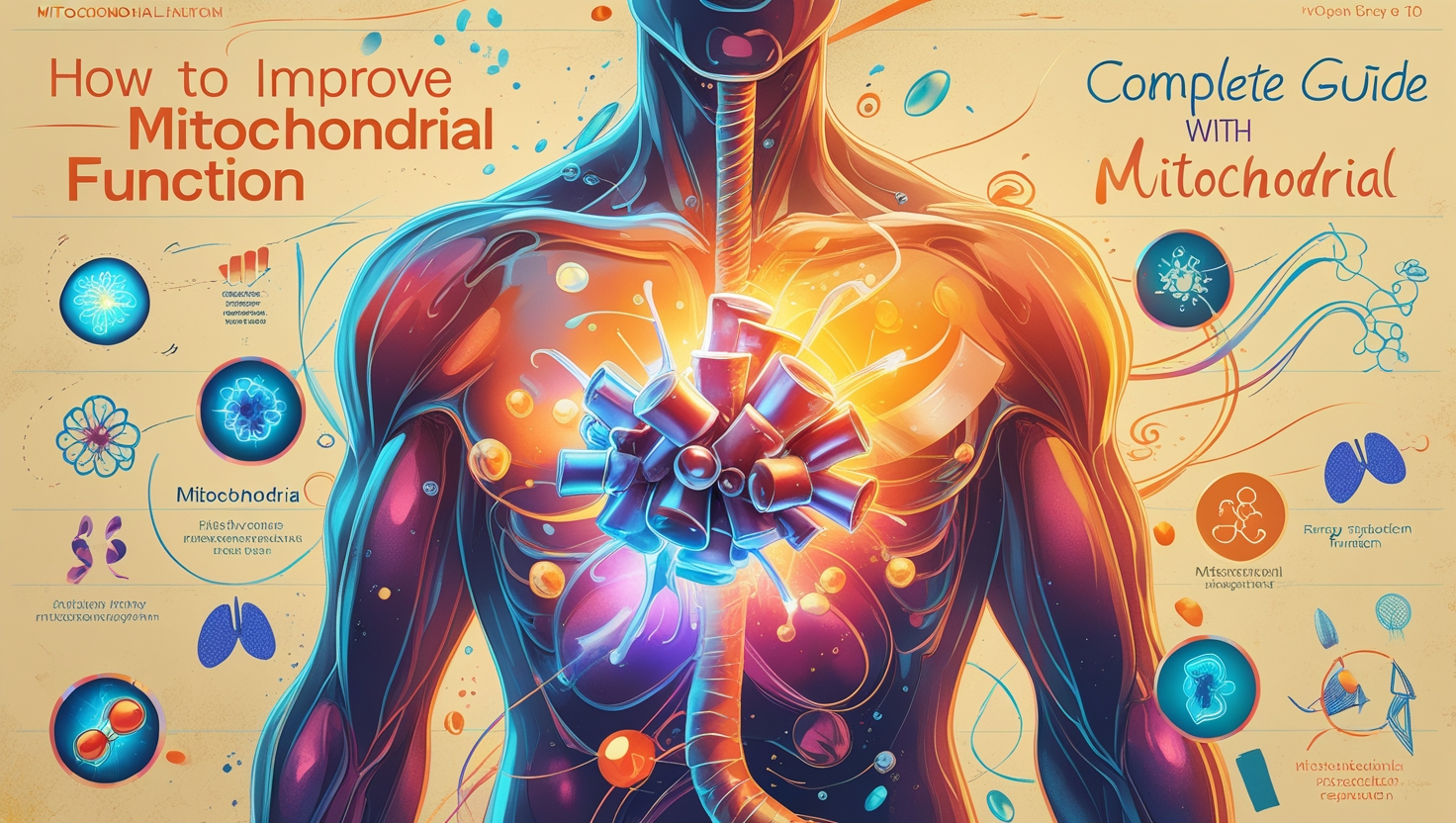How to Improve Mitochondrial Function: Complete Guide with Mitochondrial Formula

Your cellular powerhouses need attention! Mitochondria – those tiny energy factories inside every cell – determine how vibrant, energetic, and healthy you feel daily. When they're firing on all cylinders, you experience sustained energy, mental clarity, and robust health. But when they're sluggish? Well, that's when fatigue, brain fog, and accelerated aging creep in.
What Are Mitochondria and Why Should You Care?
Think of mitochondria as the engine room of your cells. These remarkable organelles convert the food you eat and the oxygen you breathe into ATP (adenosine triphosphate) – your body's primary energy currency. Pretty cool, right? Each cell contains anywhere from a few hundred to several thousand mitochondria, depending on the tissue's energy demands.
However, here's the kicker: mitochondrial function naturally declines with age. By the time you hit 40, mitochondrial efficiency can drop by up to 20%! Environmental toxins, chronic stress, poor diet, and sedentary lifestyles accelerate this decline. The result? You feel older, more tired, and less resilient than your years suggest.
The Science Behind Mitochondrial Dysfunction
Mitochondrial dysfunction isn't just about feeling tired after lunch. Oh no, it's far more complex than that! Research shows compromised mitochondrial function contributes to numerous health challenges, including cardiovascular disease, neurodegenerative conditions, diabetes, and premature aging.
Dr. Eva Detko, a leading mitochondrial researcher, explains that “mitochondrial dysfunction is at the root of most chronic diseases.” The intricate dance between mitochondrial DNA (mtDNA) and nuclear DNA requires precise coordination. When this symphony goes off-key, cellular chaos ensues. Free radicals increase, energy production plummets, and cellular repair mechanisms falter.
Key Strategies to Boost Mitochondrial Function
Nutritional Powerhouses for Cellular Energy
Nutrition forms the foundation of mitochondrial health. Your mitochondria are literally what you eat! Certain nutrients act as cofactors in energy production, while others protect against oxidative damage.
Essential nutrients for mitochondrial support include:
- Coenzyme Q10 (CoQ10): This lipid-soluble antioxidant is crucial for electron transport chain function
- PQQ (Pyrroloquinoline Quinone): Stimulates mitochondrial biogenesis – the creation of new mitochondria
- B-vitamins: Especially B1 (thiamine), B2 (riboflavin), B3 (niacin), and B5 (pantothenic acid)
- Magnesium: Required for over 300 enzymatic reactions, including ATP synthesis
- Alpha-lipoic acid: A powerful antioxidant that crosses the blood-brain barrier
- Acetyl-L-carnitine: Transports fatty acids into mitochondria for energy production
Whole foods rich in these nutrients include wild-caught salmon, grass-fed organ meats, leafy greens, nuts, seeds, and colorful vegetables. However, modern agriculture and food processing often leave gaps in nutritional density. That's where targeted supplementation comes in handy.
The Power of Intermittent Fasting
Intermittent fasting (IF) isn't just a trendy weight-loss tool – it's mitochondrial medicine! During fasting periods, your body initiates autophagy, a cellular housekeeping process that removes damaged mitochondria and stimulates the production of new, healthy ones.
Research published in the journal Cell Metabolism demonstrates that intermittent fasting enhances mitochondrial respiratory capacity and promotes mitochondrial biogenesis. Start with a 12-hour eating window and gradually extend fasting periods as your body adapts. Remember, consistency trumps perfection in this game.
Exercise: Your Mitochondria's Best Friend
Moving your body is non-negotiable for mitochondrial health. But here's the thing – not all exercise is created equal when it comes to mitochondrial benefits. High-intensity interval training (HIIT) and resistance training create beneficial stress that triggers mitochondrial adaptations.
A groundbreaking study in Cell Metabolism found that HIIT improved mitochondrial respiration by up to 69% in older adults! The magic happens during recovery – your mitochondria work overtime to restore energy balance, becoming more efficient in the process. Aim for 3-4 HIIT sessions weekly, combined with strength training and gentle movement on off days.
Cold Exposure and Heat Therapy
Hormesis – beneficial stress that makes you stronger – extends to temperature extremes. Cold exposure through ice baths, cold showers, or cryotherapy stimulates mitochondrial biogenesis and improves cold-induced thermogenesis. Meanwhile, heat therapy via saunas enhances heat shock proteins that protect mitochondria from damage.
Dr. Rhonda Patrick's research highlights how regular sauna use (4-7 times weekly) increases mitochondrial mass and improves cardiovascular health. Start slowly with either modality – your mitochondria need time to adapt to these beneficial stressors.
Understanding Mitochondrial Formula Supplements
What Makes an Effective Mitochondrial Formula?
A comprehensive mitochondrial formula should address multiple pathways of energy production and cellular protection. Look for products containing synergistic combinations of the nutrients mentioned earlier, plus additional compounds like NAD+ precursors, antioxidants, and bioavailability enhancers.
Quality matters tremendously in supplement selection. Third-party testing, pharmaceutical-grade ingredients, and proper dosing separate effective products from marketing hype. Research the manufacturer's reputation, ingredient sourcing, and clinical studies supporting their formulations.
Timing and Dosing Considerations
Mitochondrial supplements work best when taken consistently over time. Most experts recommend taking them with meals to enhance absorption, particularly fat-soluble nutrients like CoQ10. However, some people prefer morning dosing to support daytime energy production.
Start with recommended dosages and monitor your response. Some individuals experience increased energy within days, while others notice gradual improvements over weeks to months. Remember – mitochondrial health is a marathon, not a sprint!
Lifestyle Factors That Impact Mitochondrial Health
Sleep: The Ultimate Mitochondrial Reset
Quality sleep is when your mitochondria undergo repair and regeneration. During deep sleep stages, your brain's glymphatic system clears metabolic waste, including damaged mitochondrial components. Chronic sleep deprivation accelerates mitochondrial decline and impairs energy production.
Prioritize 7-9 hours of quality sleep by maintaining consistent bedtime routines, optimizing your sleep environment, and avoiding blue light exposure before bed. Consider sleep-promoting supplements like magnesium glycinate or melatonin if needed, but address root causes first.
Stress Management and Mitochondrial Resilience
Chronic stress is kryptonite for mitochondria! Elevated cortisol levels increase oxidative stress, impair mitochondrial function, and accelerate cellular aging. Conversely, well-managed stress through practices like meditation, yoga, or deep breathing enhances mitochondrial resilience.
Regular stress management isn't luxury – it's essential maintenance for your cellular powerhouses. Find practices that resonate with you and commit to consistency. Even 10 minutes daily of mindfulness can positively impact mitochondrial health over time.
Environmental Factors and Mitochondrial Protection
Reducing Toxic Load
Environmental toxins are silent mitochondrial saboteurs. Heavy metals, pesticides, electromagnetic fields (EMFs), and air pollution create oxidative stress that damages mitochondrial membranes and DNA. While we can't eliminate all exposures, we can minimize them strategically.
Choose organic foods when possible, filter your water, use natural cleaning products, and create EMF-free zones in your home, especially the bedroom. Support your body's natural detoxification pathways through adequate hydration, regular sweating (exercise or sauna), and liver-supporting foods like cruciferous vegetables.
Light Exposure and Circadian Rhythms
Your mitochondria operate on circadian rhythms too! Natural light exposure, particularly morning sunlight, helps synchronize cellular clocks and optimize mitochondrial function. Red light therapy has shown promise in enhancing mitochondrial respiratory capacity and reducing oxidative stress.
Conversely, artificial blue light exposure, especially at night, disrupts circadian rhythms and impairs mitochondrial repair processes. Invest in blue light blocking glasses, use warm lighting in the evening, and prioritize natural light exposure during the day.
Advanced Strategies for Mitochondrial Optimization
Personalized Approaches Based on Testing
Advanced practitioners now use specialized testing to assess mitochondrial function. Organic acid tests, comprehensive metabolic panels, and genetic testing can reveal individual variations in mitochondrial efficiency and guide personalized interventions.
For instance, certain genetic polymorphisms affect CoQ10 synthesis or B-vitamin metabolism. Understanding your unique biochemistry allows for targeted supplementation and lifestyle modifications that maximize mitochondrial health outcomes.
Emerging Therapies and Technologies
The field of mitochondrial medicine continues evolving rapidly. Promising therapies include NAD+ IV therapy, hyperbaric oxygen treatment, photobiomodulation (red light therapy), and peptide therapies like MOTS-c and humanin.
While these advanced interventions show promise, remember that foundational strategies – proper nutrition, regular exercise, quality sleep, and stress management – remain the cornerstone of mitochondrial health. Fancy therapies can't compensate for poor lifestyle habits!
Frequently Asked Questions
Q: How long does it take to improve mitochondrial function? A: Individual responses vary significantly, but many people notice improved energy within 2-4 weeks of implementing comprehensive strategies. Full mitochondrial regeneration can take 3-6 months of consistent effort.
Q: Can mitochondrial function be restored at any age? A: Absolutely! While mitochondrial decline occurs naturally with aging, research shows that targeted interventions can significantly improve function at any age. It's never too late to start supporting your cellular powerhouses.
Q: Are mitochondrial supplements safe for everyone? A: Most mitochondrial nutrients are generally safe for healthy adults, but individual tolerances vary. Consult healthcare providers before starting new supplements, especially if you have medical conditions or take medications.
Q: What's the most important factor for mitochondrial health? A: There's no single “most important” factor – mitochondrial health requires a comprehensive approach. However, regular exercise and adequate sleep form the foundation upon which other interventions build.
Q: Can dietary changes alone improve mitochondrial function? A: Diet plays a crucial role, but optimal mitochondrial health requires multiple lifestyle factors working synergistically. Think of it as an orchestra – every instrument matters for beautiful music!
Final Thoughts: Your Journey to Cellular Vitality
Improving mitochondrial function isn't about quick fixes or miracle cures. It's about consistently supporting your body's innate healing wisdom through evidence-based strategies. The combination of targeted nutrition, regular movement, quality sleep, stress management, and environmental awareness creates the perfect storm for mitochondrial optimization.
Your mitochondria have been faithfully serving you since birth – now it's time to return the favor! Start with one or two strategies that resonate with you, build consistency, then gradually expand your mitochondrial support toolkit. Remember, small daily actions compound into extraordinary long-term results.
Whether you choose a comprehensive mitochondrial formula, embrace intermittent fasting, or dive into cold exposure therapy, your cellular powerhouses will thank you with increased energy, mental clarity, and vibrant health. After all, when your mitochondria thrive, you thrive!





